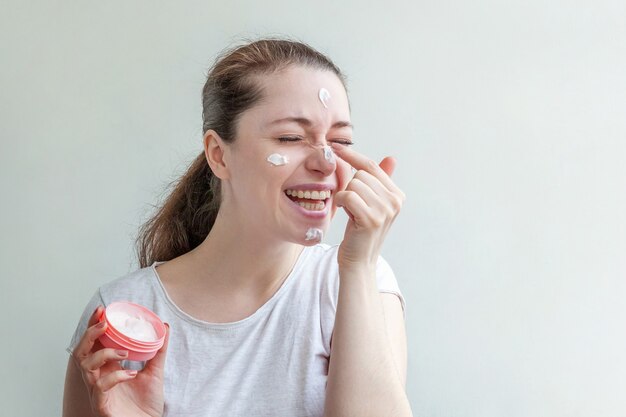Mastering Hormonal Acne: Your Guide to Clear, Confident Skin
Hormonal acne can be an unexpected companion on your journey through life, often arriving during those crucial teenage years or surprising you during adulthood. If you're battling this common yet frustrating condition, you're not alone—and you're in the right place for guidance. Understanding how to manage hormonal acne can help you achieve healthier, clearer skin.
Understanding Hormonal Acne: What's Going On?
Hormonal acne is influenced by fluctuations in hormone levels, which can lead to increased oil production in the skin. This usually results in acne lesions, often manifesting as deep, cystic pimples generally found on the lower part of the face, such as the jawline, cheeks, chin, and sometimes the neck. While acne is common amongst teenagers, hormonal fluctuations during adulthood can also lead to breakouts caused by menstrual cycles, pregnancy, or even stress.
The Culprits Behind the Breakouts
- Androgens: These are male hormones present in both males and females. They increase during puberty and can lead to enlarged sebaceous glands, which in turn produce more oil.
- Menstrual Cycle: Many women experience "cyclical breakouts" aligning with their menstrual cycle as hormone levels fluctuate.
- Stress: Stress triggers the release of cortisol, a hormone that can exacerbate acne.
- Diet: Some studies suggest that foods with a high glycemic index, as well as dairy, can worsen acne.
- Environmental Factors: Pollution and high humidity can also worsen acne.
Practical Steps to Manage Hormonal Acne
While battling hormonal acne can feel overwhelming, there's a wide range of strategies you can explore. Let's delve into some effective methods, from lifestyle changes to skincare routines.
Balancing Your Lifestyle
- Adopt a Balanced Diet: Incorporate plenty of fruits, vegetables, and foods rich in antioxidants. Some individuals find improvements by reducing dairy and refined carbs.
- Stay Hydrated: Drinking water helps flush out toxins and supports healthy skin.
- Manage Stress: Incorporate relaxation techniques such as yoga, meditation, or even simple deep-breathing exercises into your routine.
- Prioritize Sleep: Ensure you're getting enough restful sleep, as this reduces stress and allows the body to heal.
Essential Skincare Routines
Building a consistent skincare routine tailored to your skin type and acne concerns is pivotal. Here are crucial steps and recommendations:
Cleansing
Choose a gentle cleanser to remove excess oil and impurities without stripping the skin. Use it twice a day—morning and night.
Exfoliation
Exfoliating 2-3 times a week with a salicylic acid-based product can help to unclog pores and reduce breakouts. Avoid harsh scrubs that may irritate your skin.
Treatment Products
Include acne treatment products with benzoyl peroxide or retinoids to help reduce inflammatory acne and unclog pores. Be sure to apply these treatments as directed to avoid irritation.
Moisturizing
Even if you have oily skin, moisturize daily with a non-comedogenic product. This helps maintain a healthy skin barrier.
Sun Protection
Sunscreen is non-negotiable. Use a broad-spectrum sunscreen with SPF 30 or higher to protect your skin from harmful UV rays and prevent post-acne marks and hyperpigmentation.
Exploring Alternative and Holistic Approaches
If you're interested in more natural or alternative approaches, there are methods worth considering that don't necessarily rely on conventional medication.
- Tea Tree Oil: This essential oil is known for its anti-inflammatory properties. It can be used as a natural spot treatment.
- Zinc Supplements: Some research suggests zinc can reduce inflammation and bacterial growth associated with acne.
- Probiotics: There's emerging evidence supporting the role of gut health in affecting skin conditions, including acne.
- Herbal Remedies: Certain herbs, like spearmint tea, are thought to have anti-androgen properties and may help reduce hormonal acne, but always consult with a healthcare provider before starting herbal supplements.
When Professional Help Might Be Needed
In some cases, managing hormonal acne might require assistance from a dermatologist. Here are options that may be considered when professional help is sought:
- Topical and Oral Treatments: Prescription retinoids and antibiotics can sometimes provide the relief you're seeking.
- Hormonal Therapy: Oral contraceptives or anti-androgen medications, such as spironolactone, might be prescribed to women to balance hormone levels.
- Barrier Repair Treatments: Procedures like chemical peels, laser therapy, or microdermabrasion might be recommended for more severe cases.
Embracing the Journey to Clear Skin
Persistence is key in the journey to manage hormonal acne. It does take time; patience and dedication are as important as any treatment you might try. Here’s how to maintain a positive mindset through it all:
- Set Realistic Expectations: Understand that treatments can take several weeks or even months to show results.
- Track Your Progress: Keeping a skincare journal can help you see what works and what doesn't while boosting your motivation as you note improvements.
- Focus on Holistic Health: When you approach acne with an emphasis on overall health—including emotional and mental well-being—you might find improvements in not just your skin but your life’s quality.
- Celebrate Small Wins: Every step toward clearer skin is worth celebrating.
Your Next Steps to Managing Hormonal Acne
To wrap things up, here’s a concise summary with practical tips and takeaways to help you on your journey:
- Diet: 🍏 Choose low-glycemic foods; reduce sugar and dairy intake.
- Hydration: 💧 Drink plenty of water.
- Skincare: 🧴 Cleanse, exfoliate, treat, moisturize, and protect with sunscreen.
- Stress Management: 🧘♂️ Practice meditation, yoga, or any calming activities.
- Lifestyle: 🛌 Prioritize sleep and overall well-being.
- Professional Advice: 👩⚕️ Consider seeing a dermatologist for persistent or severe cases.
By integrating these strategies, you'll be better equipped to manage hormonal acne and move towards clearer, healthier skin. Stay consistent, be patient with yourself, and remember that every small change contributes to total skincare success. 🌟

